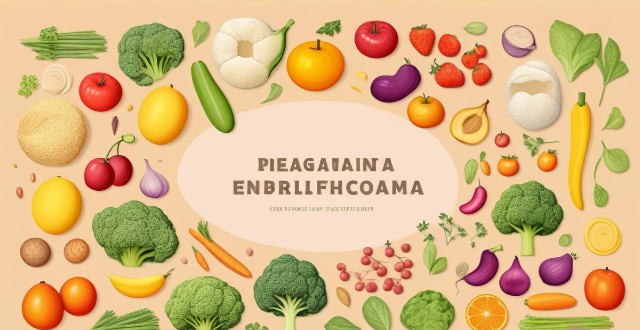During pregnancy, it is important to consume a balanced diet that provides all the necessary nutrients for both mother and baby. Some of the best foods to eat during pregnancy include fruits, vegetables, protein sources, whole grains, dairy products, iron-rich foods, omega-3 fatty acids, and water. It is also important to avoid certain foods and limit caffeine intake.

What are the best foods to eat during pregnancy?
During pregnancy, a woman's body undergoes significant changes, and her nutritional needs also change. It is important to consume a balanced diet that provides all the necessary nutrients for both mother and baby. Here are some of the best foods to eat during pregnancy:
1. Fruits: Fruits are rich in vitamins, minerals, and fiber. They also provide energy and help prevent constipation. Some good choices include bananas, apples, oranges, and berries.
2. Vegetables: Vegetables are another excellent source of vitamins and minerals. They also provide fiber and help with digestion. Some good choices include spinach, kale, carrots, and sweet potatoes.
3. Protein: Protein is essential for building new cells and tissues in the body. Good sources of protein include lean meats, fish, eggs, and legumes.
4. Whole grains: Whole grains are a good source of complex carbohydrates and fiber. They also provide energy and help with digestion. Some good choices include brown rice, quinoa, and whole wheat bread.
5. Dairy products: Dairy products are an excellent source of calcium and vitamin D, which are important for bone health. Some good choices include milk, yogurt, and cheese.
6. Iron-rich foods: Iron is important for preventing anemia in pregnant women. Good sources of iron include red meat, beans, lentils, and dark leafy greens.
7. Omega-3 fatty acids: Omega-3 fatty acids are important for brain development in the fetus. Good sources include fatty fish like salmon and tuna as well as nuts and seeds.
8. Water: Drinking enough water is important for staying hydrated and preventing constipation. It is recommended to drink at least 8 cups of water each day.
It is important to avoid certain foods during pregnancy, such as raw meats, unpasteurized dairy products, and fish that may contain high levels of mercury or other toxins. It is also important to limit caffeine intake to less than 200 mg per day and avoid alcohol altogether during pregnancy.